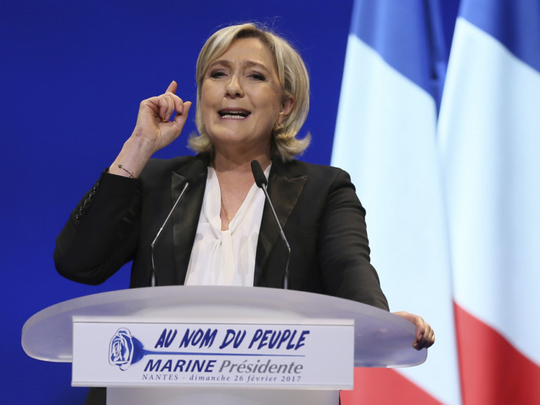
As the French election race heats up, the media all over the world is scrutinising the key players in the fray and their policies.
“Social democracy is struggling everywhere in Europe. But, as Tolstoy might have said, the French socialist family is unhappy in its own way. Part of this has to do with the dismally low ratings of President François Hollande at the end of his five-year term. But internal squabbling, personal feuds and ideological confusion have left their mark too,” said the Guardian in an editorial.
Observing that France had shifted sharply to the right, it said: “It’s not least because of the trauma left by terrorist attacks. Marine Le Pen of the Front National thinks she can capitalise. She will court traditional left-wing voters by casting herself as a defender of the welfare system, against the ‘Thatcherite’ policies that François Fillon, the mainstream right-wing candidate, has put forward. Mr Fillon is currently entangled in a scandal over payments made to his wife from parliamentary funds, another potential boost for Ms Le Pen.”
The paper also warned that France was facing a dangerous era of political turbulence. “The stakes are high for Europe too. In 2002, similar divisions helped create the conditions in which a far-right candidate [Marine Le Pen’s father] reached the presidential run-off. Now, worse could happen. France is shaken by terrorism, racked by social tensions and suffering high unemployment. This feeds deep distrust of politicians.”
The New York Times focused on an entirely different aspect of the election in an editorial titled ‘Keeping the Kremlin’s Hands Off France’s Elections’. With the US engulfed in questions about Russia’s role in the 2016 presidential election, the paper said, France is determined to head off any such meddling in its presidential election.
“Marine Le Pen, the far-right National Front candidate, who has received Russian financing, is expected to win the most votes in a crowded field in the first round of voting, on April 23. But Mr Emmanuel Macron, who is campaigning for a strong European Union that can stand up to Russia, could defeat her in the decisive May 7 run-off vote. The Kremlin’s interest in the outcome is evident — all the more so given upcoming elections this year in the Netherlands and Germany, where right-wing populist parties are also on the rise,” the paper said.
Canada’s North Shore News meanwhile drew the world’s attention to the rhetoric of hatred that’s often been seen spewing from the French political arena, and its global impact. “A factory can be shuttered for releasing harmful levels of toxicity. However, there’s no effective mechanism to regulate websites trading in noxious political discourse. The man accused of the Quebec mosque attack is an internet troll known for his admiration of Marine Le Pen, France’s far-right demagogue who once likened praying Muslims to invading Nazis. The days when we could dismiss trolls as innocuous, basement-dwelling buffoons has sadly ended. Several mass murders on US college campuses have been carried out by shooters who found acceptance in the hateful fringe of online havens,” the paper said.
Weighing in on the issue, Japan Times said: “France goes to the polls for the first round of its presidential election in April and there is fear that ballot will produce the same upheavals as did the presidential campaign in the United States and the Brexit vote in the United Kingdom. In the uncertainty that has swamped politics in Europe, Le Pen appears to have better chances than ever before, although she is being pressed by another challenger to the established political order, Emmanuel Macron... However, the shared enmity toward Le Pen — whose fiercely nationalistic agenda has been supplemented in this campaign with a call to pull France from the European Union — could benefit the left. There are reports that Socialist candidate Benoit Hamon is discussing a joint effort with his hard-left counterpart, Jean-Luc Melenchon. Polls indicate that a single candidate that unites their two constituencies would win enough votes to make the May runoff.”




_resources1_16a31069e4e_small.jpg)





